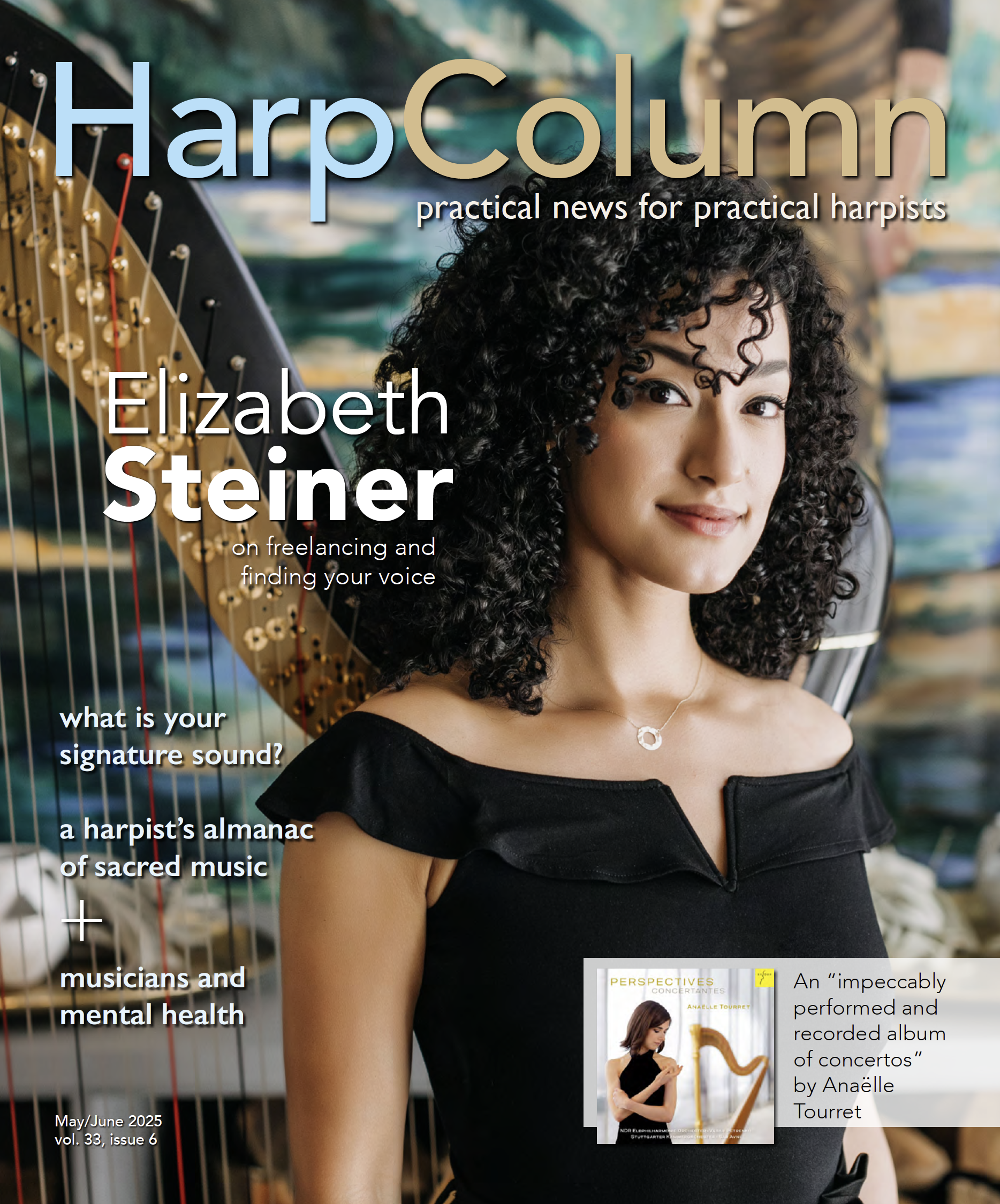Home › Forums › Teaching the Harp › Majoring in Music?
- This topic has 56 replies, 16 voices, and was last updated 17 years, 8 months ago by
Diane Patenaude.
-
AuthorPosts
-
July 6, 2006 at 2:56 am #87335
unknown-user
ParticipantI’ll add one more thing. As Barbara mentioned, the practice time
required for music can make it one of the most difficult degrees. Some
science majors also get caught up in extended lab times. Some of the
double majors that work best with music would be education and
psychology like I mentioned before. Oftentimes the approach to learning
in these fields is guided by research that shows people learn best when
relaxed and not overly stressed. Sometimes the professors and students
in these fields are just plain nice. 🙂 It can be a surprise after the
rigors of music performance.July 6, 2006 at 3:09 am #87336unknown-user
ParticipantEek out a living is right! I went to college first, then a conservatory, which I would recommend, as I was much better educated than the conservatory kids doing undergrad degrees, though they could play their instruments better. I was unable to take art classes because of their extraordinary time demands: three three -hour classes per week plus at least nine hours more of studio practice time. What also really cut into my studies and practice was doing about fifteen hours a week of sometimes menial work/study. By the way, menial work-study was once shown to be an illegal practice of schools to avoid hiring more workers. Work-study was created for students to solely work within their spheres of study, not washing dishes in the cafeteria.
One of the important benefits of studying music is learning to think creatively. No doubt that is why so many musicians have had successful careers in computer software and such. I constantly think of viable businesses or products I can’t develop.
July 6, 2006 at 2:54 pm #87337unknown-user
ParticipantHello Basel,
Please don’t give up. Going to Dubai could be a stepping stone. Saul is
right – if you can find a way to make enough to buy a harp, perhaps a
lever harp, then start accepting gigs and students. Maybe you could
gradually cut back on your non-music work load as you build up
freelancing. There are some places where you can buy a lever harp and
within five years trade it in towards a pedal harp for it original
value. That might be a way to go for you. Although I realize it could
be difficult saving up enough as a salesperson. Maybe you could find a
piano gig first on top of your sales and use that money towards a lever
harp, then towards a pedal harp. While in school I took piano and harp
at the same time, so learned the same pieces on both instruments. It
helps with the memorization later on to have a feel for the phrasing,
etc. Maybe you could start playing harp repertoire on piano for now?If your first job in sales is just shoes or something, maybe you could
continue to look until you find something like a restaurant that has a
piano you could play as part of your job. It helps me to see each thing
as a step – not permanent – but a step towards an eventual goal. You
know I wish you the best and will keep in contact.July 6, 2006 at 7:53 pm #87338unknown-user
ParticipantI would like to add one thought. Many harpists give piano lessons, and it is a logical back-up as some of the students may switch to harp at some point. I don’t have enough training in piano to teach, so don’t neglect piano minor studies while in school as I did. Or have another secondary instrument that is popular, like voice or flute or violin.
July 7, 2006 at 4:04 pm #87339kreig-kitts
MemberBarbara, I’m afraid that as a professional librarian, I must light into you for your reference to “oh, I don’t know–music librarianship or something.”
July 7, 2006 at 8:58 pm #87340Evangeline Williams
ParticipantSomeone mentioned the ‘fallback plan’.
July 7, 2006 at 10:09 pm #87341carl-swanson
ParticipantKreig- I finally managed to stop laughing long enough to write this.
July 7, 2006 at 10:29 pm #87342carl-swanson
ParticipantSeveral people, including myself, have mentioned ‘fallback plans’ as part of making career and advanced education decisions.
July 7, 2006 at 11:39 pm #87343barbara-brundage
ParticipantHello, Kreig. I didn’t say that anyone could become a music librarian, just that it doesn’t require 9 hours in the practice room in addition to academics.
(BTW, I have an MA in English, and I know all about those graduate language requirements.)
July 8, 2006 at 2:21 am #87344Jerusha Amado
ParticipantDear Barbara,
You did leave the impression, albeit unintentionally,
July 8, 2006 at 2:24 am #87345unknown-user
ParticipantThese are the qualities you need to survive: find and fill a need, be
flexible and adaptable, always have contingency plans. Plan like a
pessimist, but enjoy life like an optimist! 🙂One thing that
is difficult once you become expert in one field is to give it up and
start over as a novice in your 40’s. That is why you are absolutely
right, Carl, that students should get a head start on a second field. I
have seen too many of my peers become disillusioned and quit music
altogether after finishing graduate degrees. I am very passionate about
helping musicians/artists to find ways to collaborate and help one
another rather than tearing each other down. A culture of mutual
support will help each of us move ahead – sometimes this may involve
using a bartering system – offering services in exchange. That is one
approach that can kick-start the economic limitations and need for
investment in the arts.From my research
into options, a master’s degree in educational psychology accepts
students with bachelor’s degrees in a variety of fields. School
psychologists make around 50K. Other areas related to this are special
education and counseling. Simply put, careers that are stable and in
demand involve a skill that provides a service either to people or to
the machines they use. Two years of your
life is not too much to ask if it means the difference between
starving, working at minimum wage, or having enough money to take care
of your health and instrument. I’ll be honest, and have seen it too
many times, but it does hurt for a talented, expert person to be
overlooked for employment and be reduced to working alongside high
school graduates to scrape by. It can be especially shocking in the
performing arts for people who have grown up impressing everyone with
their gifts, and then suddenly nothing. When you are 18 it probably
feels like it could never happen because opportunities have been
provided at school, church, and family.Piano is a useful backup and has provided my bread and butter for about
5 years of my life. I have found it inconsistent support, though. The competition in piano can be more heated
than harp, actually, because there are so many pianists with doctorates
looking for work. Even though I have a doctoral minor in piano pedagogy
and years of experience, I just don’t have time to keep up advanced
repertoire performance and find it conflicts with harp technically just
a bit (some issues with wrist stability vs. flexibility, and left hand
overplaying on piano while underplaying on harp. It’s great to do both,
but extremely difficult to really
excel in both as a performer is all I am saying. I might be tempted to
suggest voice or a woodwind and harp. it’s useful to focus on a melodic
instrument to emphasize phrasing and a harmonic instrument. This also
teaches good breathing habits.July 8, 2006 at 8:24 pm #87346barbara-brundage
Participant>I certainly had to do so in order to graduate summa cum laude, earn two major awards (one university-wide and one from my department) and to receive recognition from the Honors College of my university (population at that time- 25,000), and I had a natural aptitude for analysis and deductive reasoning.
Sorry, Jerusha, I’m not going to get involved in a discussion of the relationship between brain power and university honors.
 July 8, 2006 at 8:57 pm #87347
July 8, 2006 at 8:57 pm #87347Jerusha Amado
ParticipantThat’s o.k., Barbara!
July 8, 2006 at 9:54 pm #87348barbara-brundage
Participant>I have tremendous respect for anyone who has obtained a degree in music performance!
So do I, Jerusha. I don’t want to masquerade under false pretences. I did all the work for a BM in performance except for one post tonal theory class and the senior recital, but I just couldn’t afford to lose another year’s income (and the theory class was two semesters that had to be taken sequentially), so I don’t have one. But I know what it’s like to go back again.
Another point of clarification: The reason I gave librarianship as my example is not because I think it’s easier, but because it’s more flexible, being more academic. You can study on the train, in the cafeteria, at 3 AM–lots of situations where practicin g (especially on the harp!) just isn’t feasible.
July 9, 2006 at 10:13 pm #87349diane-michaels
SpectatorI encourage students (mine and others) to major in performance.
-
AuthorPosts
- You must be logged in to reply to this topic.





